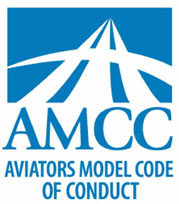Teaching the Aviators
Model Code of Conduct to Kids, an abridged and simplified explanation of the Aviators
Model Code of Conduct (AMCC), was released today by the project’s Permanent
Editorial Board. Written for use in the classroom with language appropriate for
children, the document exposes young students to important values shared by
safe and successful aviators.
Judith A. “Captain Judy” Rice, founder of Think Global Flight commented, “Think Global Flight and Teaching the Aviators Model Code of Conduct to Kids will bring awareness of the boundless opportunities within the aviation and aerospace industries to the classrooms around the world. The AMCC will introduce students to what it takes to be a good pilot, to fly safely, and be a good passenger if they take a ride in a small plane. Learning the basic rules of flying will help them succeed in many areas of their lives—as students now, and as adults in the future.”

Developed by a team of aviation professionals and drawing
upon decades of research and experience, the AMCC promotes ongoing improvements
in flying quality and safety. The AMCC:
· promotes flight and ground safety, professionalism, and pilot contributions to the aviation community and society at large,
· encourages the development and adoption of good judgment, ethical behavior, and personal responsibility, and
· supports improved communications between pilots, regulators, and others in the aviation industry.
The Code of Conduct has received extensive industry review
and presents a vision of aviation excellence within its seven sections: (1)
General Responsibilities of Aviators; (2) Passengers and People on the Surface;
(3) Training and Proficiency; (4) Security; (5) Environmental Issues; (6) Use
of Technology; (7) Advancement and Promotion of Aviation. The Code is a living
document and will be periodically updated to reflect changes in standards,
practice, and the aviation environment.
The Aviators Model Code of Conduct anchors a family of similar codes including the Aviation Maintenance Technicians Model Code of Conduct, the Flight Instructors Model Code of Conduct, the Glider Aviators Model Code of Conduct, the Light Sport Aviators Model Code of Conduct, the Seaplane Pilots Model Code of Conduct, and the Student Pilots Model Code of Conduct. Developed as a volunteer effort, each is available as a free public service along with supporting materials at <www.secureav.com>. For more information about the Aviators Model Code of Conduct, contact<PEB@secureav.com>. For more information regarding Think Global Flight visit <www.thinkglobalflight.org>.